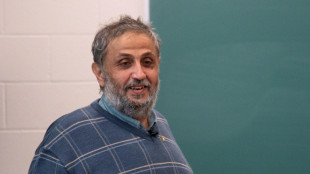-
 Sweeping Vietnam internet law comes into force
Sweeping Vietnam internet law comes into force
-
Thousands attend Christmas charity dinner in Buenos Aires

-
 Demand for Japanese content booms post 'Shogun'
Demand for Japanese content booms post 'Shogun'
-
Mystery drones won't interfere with Santa's work: US tracker

-
 Global stocks mostly higher in thin pre-Christmas trade
Global stocks mostly higher in thin pre-Christmas trade
-
NASA probe makes closest ever pass by the Sun

-
 Global stocks mostly rise in thin pre-Christmas trade
Global stocks mostly rise in thin pre-Christmas trade
-
Global stocks mostly rise after US tech rally

-
 Investors swoop in to save German flying taxi startup
Investors swoop in to save German flying taxi startup
-
Saving the mysterious African manatee at Cameroon hotspot

-
 The tsunami detection buoys safeguarding lives in Thailand
The tsunami detection buoys safeguarding lives in Thailand
-
Asian stocks mostly up after US tech rally

-
 US panel could not reach consensus on US-Japan steel deal: Nippon
US panel could not reach consensus on US-Japan steel deal: Nippon
-
The real-life violence that inspired South Korea's 'Squid Game'

-
 El Salvador Congress votes to end ban on metal mining
El Salvador Congress votes to end ban on metal mining
-
Five things to know about Panama Canal, in Trump's sights

-
 Mixed day for global stocks as market hopes for 'Santa Claus rally'
Mixed day for global stocks as market hopes for 'Santa Claus rally'
-
Trump's TikTok love raises stakes in battle over app's fate

-
 European, US markets wobble awaiting Santa rally
European, US markets wobble awaiting Santa rally
-
NASA solar probe to make its closest ever pass of Sun

-
 Volkswagen boss hails cost-cutting deal but shares fall
Volkswagen boss hails cost-cutting deal but shares fall
-
Sweden says China blocked prosecutors' probe of ship linked to cut cables

-
 UK economy stagnant in third quarter in fresh setback
UK economy stagnant in third quarter in fresh setback
-
Global stock markets edge higher as US inflation eases rate fears

-
 US probes China chip industry on 'anticompetitive' concerns
US probes China chip industry on 'anticompetitive' concerns
-
Mobile cinema brings Tunisians big screen experience

-
 Honda and Nissan to launch merger talks
Honda and Nissan to launch merger talks
-
Asian markets track Wall St rally as US inflation eases rate fears

-
 Honda and Nissan expected to begin merger talks
Honda and Nissan expected to begin merger talks
-
Asian markets track Wall St rally as US inflation eases rate worries

-
 Trump vows to 'stop transgender lunacy' as a top priority
Trump vows to 'stop transgender lunacy' as a top priority
-
Beyond Work Unveils Next-Generation Memory-Augmented AI Agent (MATRIX) for Enterprise Document Intelligence

-
 Sweet smell of success for niche perfumes
Sweet smell of success for niche perfumes
-
'Finally, we made it!': Ho Chi Minh City celebrates first metro

-
 Tunisia women herb harvesters struggle with drought and heat
Tunisia women herb harvesters struggle with drought and heat
-
Trump threatens to take back control of Panama Canal

-
 Secretive game developer codes hit 'Balatro' in Canadian prairie province
Secretive game developer codes hit 'Balatro' in Canadian prairie province
-
Stellantis backtracks on plan to lay off 1,100 at US Jeep plant

-
 Banned Russian skater Valieva stars at Moscow ice gala
Banned Russian skater Valieva stars at Moscow ice gala
-
Biden signs funding bill to avert government shutdown

-
 Sorrow and fury in German town after Christmas market attack
Sorrow and fury in German town after Christmas market attack
-
France's most powerful nuclear reactor finally comes on stream

-
 Sierra Leone student tackles toxic air pollution
Sierra Leone student tackles toxic air pollution
-
Amazon says US strike caused 'no disruptions'

-
 Qualcomm scores key win in licensing dispute with Arm
Qualcomm scores key win in licensing dispute with Arm
-
Scientists observe 'negative time' in quantum experiments

-
 US approves first drug treatment for sleep apnea
US approves first drug treatment for sleep apnea
-
Amazon expects no disruptions as US strike goes into 2nd day

-
 US confirms billions in chips funds to Samsung, Texas Instruments
US confirms billions in chips funds to Samsung, Texas Instruments
-
Wall Street rebounds despite US inflation ticking higher

Inside a semiconductor 'clean room' at Japan's top university
To study semiconductors at Japan's top university, first you need the right clothes -- protective overalls, shoe covers, plastic gloves and a lightweight balaclava to keep your hair out of the way.
Then, surgical mask in place, you step inside an "air shower" to remove all the dust from your body that could potentially contaminate the precision equipment.
Now, you are ready to enter the University of Tokyo's clean room, a highly controlled space where microchips are handled.
Clean rooms, a vital part of semiconductor factories, are also found at such universities, where aspiring tech innovators conduct research.
Chips are an indispensable part of the modern economy, used in everything from smartphones to cars and weapons.
That has made them politically sensitive, with the industry frequently caught in the crossfire as the United States and China tussle over access to advanced tech.
Japan is also ramping up its efforts to revive its once-world-leading chip industry: the government has promised up to $25 billion in subsidies to help triple sales of domestically produced chips by 2030.
Taiwanese chip behemoth TSMC opened a semiconductor factory in southern Japan in February and is planning a second facility for more advanced chips.
And a multi-billion-dollar joint venture called Rapidus, involving Sony, Toyota, IBM and others, aims to mass produce next-generation logic chips in Japan from 2027.
Chip expert and University of Tokyo professor Tadahiro Kuroda said Japan's push into a sector where it was once dominant feels like "spring has returned".
At the university's 600 square-metre (6,500 square-foot) chip lab, filled with cutting-edge machines, students use tweezers to handle the delicate materials.
With pipettes, they drip a red liquid chemical onto gleaming, pristine silicon wafers designed to contain a dizzying number of tiny transistors.
PhD student Kei Misumi, 27, who regularly works in the clean room, told AFP he hopes such advanced technology will further enrich people's lives.
X.Wong--CPN




